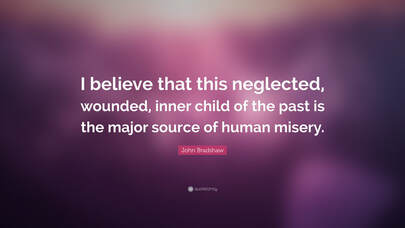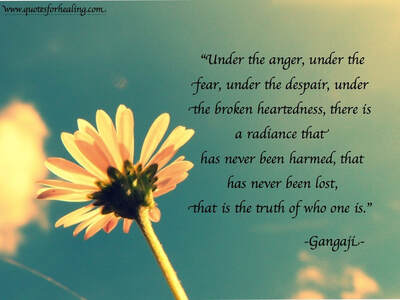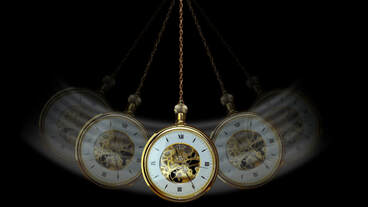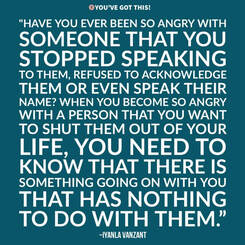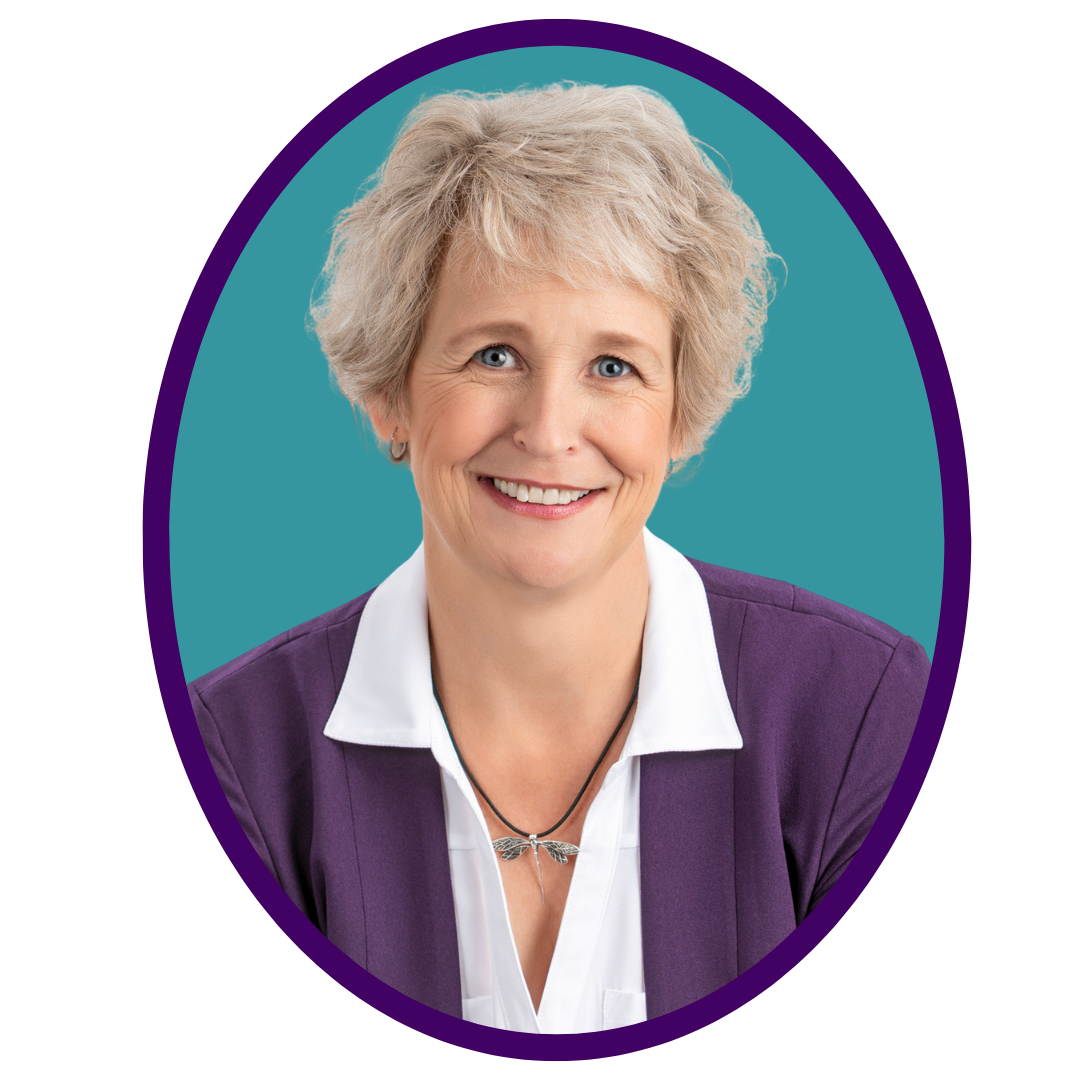|
Why do we talk about the Inner Child as though there's only one living inside of us? If you think of your authentic self as the soul you turned up with when you began this life, you can consider all of your emotional traumas as those things that have chipped away at it throughout your lifetime, stunting your growth at those points. Or can you honestly tell me that you've only suffered one emotional trauma? The National Institute of Mental Health defines childhood trauma as, "The experience of an event that is emotionally painful or distressful, which often results in lasting mental and physical events." Notice the use of the word experience. An adult looking in or looking back would probably never consider some of these events trauma-inducing, but that's part of the shame that the adult you carries; you can rationalise things all you want, but getting beaten up by a girl is emasculating. Or a dog barking in your face when you're an infant is terrifying. Or Daddy letting go of your bike when he promised he wouldn't is trust-breaking. Sure, you can look back at all of it now and understand why you don't trust strong women (or their dogs), but until you heal your wounded inner children, you will likely never overcome it. OK, so those're some pretty innocuous consequences, I agree, but oftentimes the traumas are infinitely more, uh, traumatic, or they layer one upon the other, colouring and solidifying an individual's view of him/herself and the world. Take, for example, the four year-old son of a single mom. Dad is in the picture but off raising another family. He is unpredictable and frequently cancels plans with the boy who concludes:
Then there's the latchkey kid who has to look after his younger siblings because his mom works until six. When she gets home , she berates the boy for not yet having dinner on the table.
What about the artistic teenager, the only son, whose father was a football star back in his day? Dad feels that he can tease and bully his son into being the boy he wanted. Dad doesn't hold back, even gets his buddies in on the action. The son thinks:
Now imagine that that is the same boy at different ages. In the example, his first wounded child is a preschooler. The wound may show up as rage, the rage his four year-old self felt, but could not express, toward his father. The second of the boy's wounded children was school-aged. The wounds might present in adulthood as social awkwardness, procrastination, and black-and-white thinking. The wounded adolescent often presents as conflict with authority figures, a sense of superiority, or a reluctance to take action. Same man, three inner children. Inner child work is fascinating and rewarding, but it can also be complex. I like to start with limiting beliefs and work backwards. Here's the list of limiting beliefs that I work from. Take a look and see which ones strike a chord with you. Please let me know if there are any others I need to add to the list.
You will recognise your own inner children by the negative thoughts in your head. You may even find that the voices sound like someone you know - your mother or father, a teacher, sibling, or bully from your childhood. Six years ago, I named mine, called them S**thead and A**hole. I thought that made them easier to tell off. More recently, however, I've learned that that's counter-productive; I had to acknowledge them as a part of me, so I've started instead saying, "Thank you for your input." Full disclosure, these days when I'm doing my own inner child work, I call all of mine L'il Wooz. *breathes* When I was born my older brother, Mike, couldn't say Christie. I was Tizzy. Yep, Tizzy turned into Tizzy Wizzy Woozle. Side note: My father used to frequent a restaurant at which I worked. In front of my full section, staff, and management, he would cry out, "Wooz!" to get my attention. But I digress... After a fair bit of work, L'il Wooz and I now have a wonderful relationship. She still pops up from time to time, in the form of anger or frustration, just to let me know where some attention is needed. We go and hang out in our hammock to chat and heal. It's really peaceful. So is my life these days, I'm blessed and happy to say. :) What do you want your legacy to be? John Bradshaw, Inner Child Therapy pioneer and author of six books including Homecoming: Reclaiming and Championing your Inner Child, used the mnemonic CONTAMINATE to define his model of how your wounded inner child can turn up in your adult life. Co-dependency Offender Behaviour Narcissism Trust issues Acting out/acting in behaviours Magical beliefs Intimacy dysfunctions Non-disciplined behaviours Addictive/compulsive behaviours Thought distortions Emptiness (apathy, depression) Bradshaw also brought the terms "inner child', 'toxic shame'. and 'dysfunctional family' into common usage. Shatter the pattern of dysfunction for your family. AuthorChristie Morden is Calgary's premier emotional legacy coach. Her unique and revolutionary blend of guided meditation and coaching techniques helps her clients achieve results fast and get the healing that they and their families need to shatter the pattern of generational emotional trauma. Leave the world better.
0 Comments
Imagine being able to reach inside and find your true self, the one you came into this world as? Imagine going back and removing all of the conditioning that self was subjected to. Who would you be today? Who could you be today? While I drove up to Radium, B.C. a couple of weeks ago, I listened to Dr. Beverly Engel’s Healing Your Emotional Self: A Powerful Program to Help You Raise Your Self-Esteem, Quiet Your Inner Critic, and Overcome Your Shame. Y’know, a little light reading. I was, as usual, searching for insights to better serve my clients. I was not disappointed. Some insights come through the words and ideas of an author, but others are arrived at as an almost visceral reaction to the same. Dr. Engel is an internationally recognised psychologist and the author of twenty-two books, but l’il old me takes great exception to some of the words she uses.
You might be saying, “But, wait, Christie. Are you arguing that abuses don’t happen?” Of course not. Abuse is a very real, very tragic thing, but Dr. Engel uses it a little too freely for my tastes. A parent who scolds a child is not being ‘abusive.’ The child may suffer emotionally for it – and forever – but there was no intent to injure on the part of the parent. Any of you parents reading this might be getting defensive. “There’s no way I caused my child emotional trauma with a simple scolding!” The adult mind understands scolding. The mind of a four-year-old? Not so much. His logic might go something like this: “Mommy is angry.” “I made Mommy angry.” “Mommy is perfect.” “There must be something wrong with me.” By the time the child learns that Mommy (or Daddy, or Grandma, or the nice daycare lady) isn’t perfect, the damage is done. You see, for a small child, the need for his caretakers to be perfect is a matter of survival. They cannot be imperfect, or the child’s life is literally in jeopardy. Conditioned with scolding (as an example) for long enough, that boy could become a man who cannot take criticism of any sort. He may lash out in anger any time he feels judged. By contrast, he may become a doormat, eager to please, never risking criticism. The boy’s mother was doing the best she knew how. Her intention was to guide her son into doing what she believed to be right. She was guiding his behaviour so he would be the kind of child she wanted him to be. The kind of child she wanted him to be. Thus begins the undermining of his true self. Nothing abusive. It was all intended to be for the greater good. Children cannot be allowed to run amok. Society’s got rules, and the child who does not follow those rules will be ostracised. That, too, is a matter of survival, isn’t it? The trouble is that societal norms change more quickly and easily than parenting styles. The latter tend to get passed down through the generations. The “children should be seen and not heard” paradigm has given us generations of kids, and, subsequently adults, with no voice. No wonder we’re looking to our leaders to take care of us and tell us what’s best for us. No wonder more of us aren’t screaming in anguish over children living in cages. That brings me to the other word Dr. Engel uses which gets my back up: Victim. You are not responsible for the conditioning you received in childhood, but, as an adult, you are responsible for fixing it. I refuse to see any grown up as a victim. The facts as I see them:
I know which world I would rather live in. It’s the one I’m trying to help promote, the one where compassion triumphs over judgment, where collaboration is ultimately seen as more advantageous than divisiveness, where we realise that global interests are self-interest. And it all starts with healing our inner children first. That’s how we turn the tides. Healing is contagious. Leave the world better This week I was working with a friend, Andrea McGuinness owner of Optimum Parenting for Families when we realised that what most parents want is to be the parent they needed as a child. In a moment of synchronicity, this morning I ran across Brené Brown’s The Gifts of Imperfect Parenting, a quote from which really hit me: “Are you the adult you want your child to become?” I’m just going to leave that right there while you check yourself for anger issues, anxiety, addiction (including workaholism), low self-esteem, perfectionism, shame… What do you want your legacy to be? AuthorChristie Morden is Calgary's premier emotional legacy coach. Her unique and revolutionary Quicknotherapy, a blend of hypnotherapy and coaching techniques, helps her clients achieve results fast and get the healing that they and their families need to shatter the pattern of generational emotional trauma. Is it Thursday already? A lot can happen when you're distracted, can't it? Yep, that's my not-so-subtle segue into talking about hypnosis. It has been brought to my attention - shout out to my brother Pete! - that in this day and age (I might be channelling my grandfather when I say that), 2019, with so many people embracing their inner Zen through meditation, hypnosis still gets relegated to the realm of sorcery and brainwashing. I blame Gilligan's Island, but... holy moly! That was in 1965, before I was even born. It was in black and white, for goodness sake! Surely, we have evolved in our thinking since then. If it were that easy to exercise mind-control over you, hypnotists would all be millionaires in the ad game, and you would have bought my twelve-session programs for yourself and all of your family members by now. But you're smart, you do your due diligence, and, most importantly, you are in control. Have you ever been hypnotised? Of course you have. Hypnosis is a natural brain state. We are in it most of the time. Any time your conscious mind drifts - when you are listening to the minister's sermon, when your spouse is walking and talking you through their every golf shot of the afternoon, when a TV commercial comes on and you don't forward through it, that's all hypnosis. But, you might be arguing, that's self-hypnosis. Let me let you in on a little secret: All hypnosis is self-hypnosis. By that logic, you are always in control. Always. Allow me to illustrate using another common example. You know those times when you are driving home and you don't remember the commute? That's hypnosis. But if something dramatic had happened - a child darting out onto the street or you seeing unexpected brake lights - you would've snapped right out of it. Control. Photo radar only catches people who are in a hypnotic state. And texters. But, Christie, what about that whole, "All hypnosis is self-hypnosis" thing? Thanks for reining me in! Allow me to offer up another example. I don't think my father would ever let me hypnotise him. I mean, he might sit down with me to ostensibly try, but his mind would probably overrule it, even if we were just doing some simple positive suggestion stuff. (I don't do therapeutic hypnosis with family members, because it can be difficult to get them to be truly open and forthcoming, y'know, vulnerable. It can be much easier to open up to a stranger, I mean, a stranger who's signed a confidentiality agreement, not, like Dave down at the 7-11, though I'm sure he's pretty tight-lipped.) Where was I? Right, Dad. I think he'd feel uncomfortable being hypnotised by me in person. I mean, I've given my folks a sleep recording, and the rumour is that it's so good that he's fast asleep before I've even spoken, but in person is a different thing. I can't see him opening up to me. What I can see is old Reggie up on stage at a hypnotist's show. Dad, uh, doesn't hate being the centre of attention. He's also been doing meditation since I was a 'tween. And he would feel safer being part of a comedic show than opening up about himself to his baby girl. See, he is in control of whether or not he gets hypnotised. Stage hypnosis works so brilliantly because the hypnotist really knows how to pick his/her participants. The ones who go up on stage really want to be there. If you've ever seen a show, what you've also seen is the power of the subconscious mind. I saw a woman eat an onion like an apple without flinching. I saw an entire group of hypnotised people go downstairs to the bathroom and come back up completely perplexed because their genitalia were suddenly the opposite gender's. And more recently, in a therapeutic setting, I have seen people sit in conversation with their estranged or deceased loved ones. I have helped people engage with and heal their wounded inner child. I have sat with a woman as she wept and forgave the father who molested her. So, no, it's not about getting people to 'cluck like a chicken'. I usually take this time to change tacks, but this is a subject that I would really like to flesh out more fully with you. The blend of hypnosis and coaching is a powerful thing. You go into a very light hypnotic state, similar to the one you go into when you’re driving, except usually with your eyes closed. That allows your conscious mind to drift, for you to get out of your own way. You know how it can be when you’re trying to remember the name of a person or TV show? The harder you think, the less likely you are to remember it, but as soon as your conscious mind goes elsewhere, there it is! Your subconscious mind is always simmering away under the surface where it collects eleven million bits of information per second. The conscious mind, by contrast, can only process fifty of them. That’s not even statistically significant! No wonder we get distracted by… squirrel!! So, as you can imagine, it doesn’t take much to get you out of your own head. Once there, you can more easily access memories. I help you reframe them so you can feel differently about them. The beauty is that the subconscious mind doesn’t recognise the difference between imagination and reality. You can have that conversation you always wanted to have with a person who is no longer in your life or even put yourself in their shoes and imagine how they were feeling in a given moment. It is a tremendous tool for fostering compassion for yourself and others. It’s not about controlling your mind but controlling your emotions, your reactions to events. It’s about figuring out why certain things that are said or done to you make you angry or sad and healing those past traumas. You are an active participant in the process and remember everything when you come out of it. Hypnosis combined with coaching is an incredibly effective way to get the results you want. A huge shift occurred for me when I learned that when we remember, we are not recalling the original event; we are remembering the last time we remembered it. Under hypnosis, you are walking us through your memories. You are in control. Imagine being able to go in and make small shifts to your emotional state within a memory. Can you see the healing effects that could have on you and, more importantly, the implications it will have on your family moving forward? Leave the world better AuthorChristie Morden is Calgary's premier Legacy Coach. Her clientele may seem diverse, but they share a common characteristic: They have gotten to a point in their lives where they are wondering what sort of legacy they are going to leave behind. They are people facing end-of-life, either their own or a loved one's. They are new grandparents and expecting parents. They are couples struggling to conceive. They are people who recognise that the ripe fruit on their family trees was more than fine jewelry, clunky furniture, and flat feet. Like low self-esteem, anger issues, addiction. I’ve been working on something new for y’all. No, it’s not my Texan vernacular; it’s a video series. What I’ve learned is that a video has to grab your attention in the first nine seconds, or you will move on to the next thing. Now, I don’t know if that’s equally true of blog posts – and I have no idea how fast you read – but I’ll assume it is. You are battered. You are broken. You are damaged. Still with me? Maybe you’re one of the few who’s done all the work and are fully mostly healed, in which case – congratulations! – and I know you, more than most, understand what I’m saying. No one escapes childhood unscathed. Maybe you’re in denial and getting defensive at the accusation. That defensiveness? That’s proof positive to me that you’re in need of healing. The great news is that all of the negative emotions we bump up against – rage, sadness, anxiety, frustration, fear – those show us the areas of our lives we need to work on. Can you imagine the freedom you would feel if you could rid yourself of them? How would your relationships improve? How would the lives of your children benefit? But where to start? The coach in me wants to give you homework. Has to, really; it’s in the handbook. Do it or not, that’s up to you. If you don’t, please do not call me to work with you. I only take on clients who are as invested in their healing as I am. A simple task: Every time you get triggered into a negative emotion, write it down. What was said/done that precipitated the emotion. Who said/did it? Make a page for it in your phone. Feel free to comment on this post. Whatever you choose to do with it, try to describe the emotion in detail. If you’re struggling to find the right word for it, look for it in the emotions list at the bottom of this page. Do that for the next five days, after which I want you to look for patterns. You will likely find out a lot about yourself with this easy task. You might be able to identify some of the limiting beliefs that attach you to those triggers. That is a brilliant first step towards your own healing. I have been working on myself for the better part of the past six years. I used to be a big ball of rage wrapped in sunshine! Its most obvious manifestation was on the golf course. I would slam clubs, take seven or eight frustrated swings at poor, innocent sand, and occasionally rip my glove to shreds. Once I even grabbed my driver by its head and swung it, hitting the driving range barrier with the grip, snapping it. The Driving Range. My behaviours were nothing, though, compared to the things I said. No, I’m not talking about my language – though I could drop the eff-bomb like nobody’s business and loudly! – but the other stuff, the words.” “You idiot!” “You’re so stupid!” “What is the matter with you?!” Helping me learn how to diminish, almost eliminate, those voices in my head is the number one thing I am grateful to my coaches for. I’m not perfect, I will never enjoy a bad shot as much as a good shot (sorry Deepak Chopra), but I live my life mostly in peace now. Golfing barefoot helps 😊 That said, there are still two things which get my back up – they are probably two sides of the same coin – disrespect and disparagement. The former has been hitting me pretty hard lately. Just last week, I was speaking to a woman I know who is moving well and truly forward in several areas of her life. She was sharing with me that she had gone for a second job interview and was eager and excited. I shared in her enthusiasm and wished her luck, before letting her know my news: I got an office (248, 1001 1 St. SE)! “Hypnosis. Just don’t make me cluck like a chicken!” Can you say, Triggered? I was angry. It took me many deep breaths to realise that it wasn’t her that I was angry with – we’re not Tier One friends, just friendly banterers, after all – it was someone else in my life who likes to laugh off and downplay even the most serious of subjects. There’s the next wounded inner child that I need to heal! I look at bumping up against our boundaries as an opportunity to learn and grow. The latter behaviour, disparagement, well, I cannot stand to see anyone – including myself – judged ‘lacking’ by anyone I know. If you feel superior to someone because of their weight, because they’re tattooed, because of their clothing style, or because of any of the other choices that they make for their lives, please don’t share it with me, but maybe ask yourself why their actions are triggering you. You might discover something about yourself. List of emotions: In my sessions, in my musings, I talk of healing emotional traumas. Please understand that these are not the same as abuses. The difference, to my mind, is intention. Unlike the catalyst for our emotional traumas, the abuser knows exactly what he or she is doing to their victim. Their motives are cold and calculated. I am tempted to reach into my bag of bad words in describing them. If you have known abuse, I hope that you have already at least begun to get the help you need. On the other hand, the scarring a person receives from a parent, teacher, schoolmate, or sibling is just life, same as the scar on my chinny chin chin. It is inevitable. It is only when the scar tissue impacts your daily life – or your progeny – that it needs to be cleaned out. It’s like an old basketball knee. Actually, the analogy I like to use is to a physical wound. Most of them are superficial and can be fixed up with a Band-Aid and a kiss, but there can be deep ones, which, if they are not tended to, can get infected and eventually poison the whole body. Beyond that, you’ve got the Superbugs which be transmitted to those nearest to us. What will your legacy be? Author Leave the world better. |
Christie MordenMental Health Coach Archives
March 2022
|
||||||
